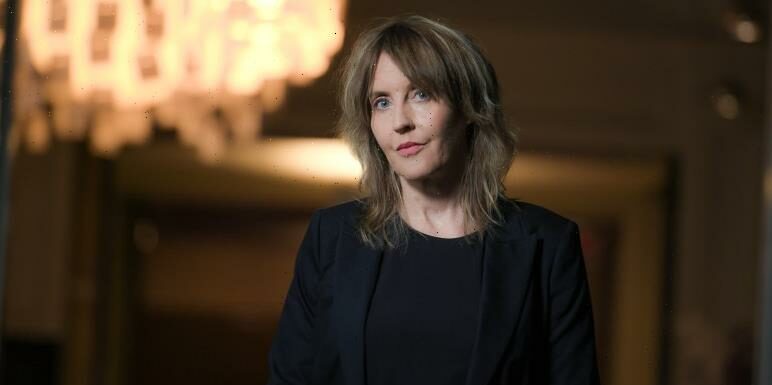
It’s advanced the careers of dozens of emerging writers, many of whom are now well established. And it’s put up to $300,000 in the pockets of authors, mentors, judges and readers each year since its inception in 2018 – putting it, in overall cash terms, on par with some of the richest literature prizes in Australia.
But The Next Chapter, a program run by The Wheeler Centre and funded by The Aesop Foundation, has been in limbo since June when it was announced the partnership with the soap company would end. And it’s still not clear if it will return.
Caro Llewellyn, CEO of the Wheeler Centre.Credit:Justin McManus/The Age
“It was an unbelievable sponsorship,” Wheeler Centre CEO Caro Llewellyn says of the $1.2 million commitment. “They were incredible. And we’re sorry to see them go.”
“We’re looking [for a new sponsor] and … We all really believe in this program … It changed the publishing landscape.”
Next Chapter was designed to champion and support writers from underrepresented backgrounds: a “gap”, Llewellyn says, the Wheeler felt it was important to fill as “the same stories were being told [in Australian literature], and they were largely being told by white men”.
Each year 10 writers were selected, awarded a stipend of $15,000, matched with prominent writers to act as their professional mentors over a year (who were also paid for their work), given a writers’ residency in the Blue Mountains and set up with various connections in the publishing industry to further their career.
Writer and broadcaster Benjamin Law, who judged entries in the first two years, says “the impact of the prize has been significant” and we only need to look at the success of poet Evelyn Araluen (a 2018 recipient of the prize) as proof.
“It was so clear from what she had submitted that this was a Halley’s Comet of a voice,” Law says. “It was so obvious that someone like her – and especially in a space like poetry that doesn’t always receive robust financial support – could benefit from a really important stepping stone to publication.
“And of course, from there, some of those early poems went on to form what was eventually Drop Bear, which won the Stella Prize [this year].”
Ennis Ćehić, another inaugural Next Chapter recipient who is now working on a subsequent book, specifically credits the program with his current success. ”It validated everything for me [and] gave me a jumping-off point for my career,” he says.
The $15,000 prize enabled Ćehić to stop working full-time at a brewery – only able to write on evenings and weekends – and pay his rent while working intensively on the stories that would eventually become Sadvertising with his mentor Nam Le. It also provided him crucial opportunities to meaningfully connect with publishers.
Three Next Chapter recipients (Adam Thompson, Evelyn Araluen and Ennis Cehic) have gone on to publish books.
Rarely offered in other literature prizes, this mentorship element is especially important, Llewellyn says, as publishing houses under increasing commercial pressures have less time to guide new writers through edits and show books “real care”.
“The whole way that the industry works has changed. And that makes it harder for an editor to champion a writer and stick with them through the process.”
Law was the beneficiary of a similar type of mentorship when he was younger, through a state-run program at Youth Arts Queensland that appears to no longer exist.
“I think it’s telling [of the state of Australian arts funding] that something that was such a huge benefit to me is no longer around,” he says.
This long-documented decimation of arts funding can have an effect on corporate interest too, Llewellyn says. “If you have a government that says ‘we don’t care about this, this is worthless, we’re going to gut it because it’s meaningless and it doesn’t do any good’, that message inevitably seeps out.”
Though she is “hopeful” The Wheeler Centre will find a new sponsor for the program (and hopeful in the new federal government reinvesting in the arts generally), she says it would be a “miracle” to find someone to match the current financial commitment – “particularly in the current climate”.
With live events coming to a standstill through the pandemic, organisations like The Wheeler Centre have had little opportunity to court corporate sponsors. And, in the midst of mounting financial pressures, sponsors have had less motivation to open their wallets.
The Aesop Foundation has been a real outlier in its support of literacy and storytelling, committing $7 million to local organisations since 2017, but the support for Next Chapter was only intended to be a four-year commitment.
“As a general principle the Aesop Foundation will partner with a particular organisation or program for a maximum of five years before a fallow period is required,” an Aesop spokesperson said.
The Melbourne-born company is also now turning more towards global philanthropy, as it builds its international business. The foundation’s Australian charity registration was voluntarily revoked in December 2021, and Aesop, a self-described “expanding global organisation” has now moved to a “global social impact model”. Aesop says it isn’t stepping away from Australia entirely, but it will now issue global grants under four pillars: education, employment, the environment and emergency response.
This could leave some other local literary initiatives in the lurch too. Notably, The Horne Prize, an annual $15,000 award for long-form nonfiction run by The Saturday Paper and Aesop, didn’t run in 2021 and has made no announcement for 2022 or beyond.
Rebecca Costello, chief executive of Schwartz Media, which publishes The Saturday Paper, says the prize may return in the future but did not want to publicly comment on whether Aesop would be involved.
The Booklist is a weekly newsletter for book lovers from books editor Jason Steger. Get it delivered every Friday.
Most Viewed in Culture
From our partners
Source: Read Full Article

